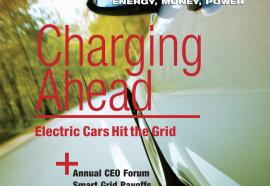V2G Shuffle
Smart charging is just the start of the electric vehicle revolution.
Electric vehicles (EV) now rolling off automakers’ production lines are expensive and limited in range, but they mark a technological tipping point. By tapping into the smart grid, EVs promise to free transportation fuel from the physical medium—raising its practical value while simultaneously diminishing its cost.








